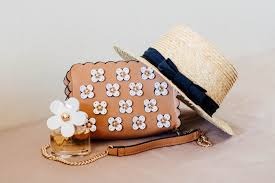1. The Evolution of Designer Accessories: From Function to Fashion
Designer accessories have long transcended their original purpose as mere functional items. Once considered necessary add-ons, they have evolved into powerful symbols of personal style, status, and individuality. Historically, accessories such as handbags, belts, and jewelry were primarily used for practical reasons—think of handbags for carrying essential items or belts for holding clothes in place. However, over time, high fashion and luxury brands have transformed these everyday items into coveted pieces that enhance an outfit and speak volumes about one’s aesthetic preferences.
The evolution of designer accessories can be traced back to the early 20th century when fashion icons like Coco Chanel redefined how we view accessories. Chanel’s iconic quilted bags and timeless pearls, for instance, revolutionized the concept of accessories by combining elegance with practicality. Today, brands like Louis Vuitton, Gucci, and Prada continue to push the boundaries of design, ensuring that accessories remain at the forefront of fashion trends.
2. Statement Pieces: The Role of Designer Accessories in Personal Style
Designer accessories have the unique ability to elevate an outfit from ordinary to extraordinary. A simple dress can be transformed by adding a designer handbag, a bold pair of sunglasses, or a luxurious silk scarf. These statement pieces serve as focal points, drawing attention and creating a cohesive look. Whether you’re aiming for a minimalist style or a more flamboyant aesthetic, the right accessory can enhance your overall ensemble and reflect your personality.
In particular, accessories like promotional tote bags, watches, and shoes have become status symbols. Owning a Hermès Birkin bag or a Rolex watch, for instance, signals both wealth and sophistication. However, it’s not just about flaunting a brand name—designer accessories allow individuals to express themselves creatively. With a wide range of options available, from classic pieces to avant-garde designs, fashion enthusiasts can curate a unique look that resonates with their personal taste and lifestyle. Ultimately, these accessories act as an extension of one’s personality, telling a story through fashion.
3. Craftsmanship and Quality: The Hallmarks of Designer Accessories
One of the defining characteristics of designer accessories is their exceptional craftsmanship and quality. Unlike fast fashion items, which are often mass-produced, designer pieces are meticulously crafted with attention to detail. Luxury brands use the finest materials, such as premium leather, exotic skins, and precious metals, ensuring that their products are not only aesthetically pleasing but also durable. This focus on quality sets designer accessories apart from their lower-end counterparts, offering both beauty and longevity.
For example, Italian fashion houses like Gucci and Fendi are renowned for their mastery of leatherwork, producing handbags and belts that are both functional and visually striking. Meanwhile, Swiss watchmakers like Patek Philippe and Audemars Piguet are celebrated for their precision engineering and timeless designs. Investing in designer accessories means owning a piece of art—one that has been crafted by skilled artisans who take pride in their work. This dedication to craftsmanship is what gives designer accessories their value, often becoming heirlooms passed down through generations.
4. The Influence of Celebrities and Social Media on Designer Accessories
In today’s digital age, celebrities and social media influencers play a significant role in shaping fashion trends, particularly when it comes to designer accessories. Platforms like Instagram and TikTok have made luxury fashion more accessible, allowing people to see their favorite celebrities and influencers flaunting the latest designer bags, shoes, and jewelry. This visibility has contributed to the growing demand for high-end accessories, as people are increasingly inspired to emulate the looks of their style icons.
Celebrities such as Rihanna, Kim Kardashian, and Harry Styles are known for their bold fashion choices, often incorporating designer accessories into their outfits. These high-profile endorsements have a powerful influence on consumer behavior, as fans seek to replicate their favorite stars’ looks. In addition, collaborations between celebrities and luxury brands, such as the partnership between Beyoncé and Tiffany & Co., further drive the desirability of designer accessories. The result is a cultural phenomenon where owning the latest “it” bag or designer shoe becomes a status symbol, amplified by the reach of social media.
5. Sustainability and Ethical Considerations in Designer Accessories
As the fashion industry grapples with the growing demand for sustainability and ethical practices, designer brands are beginning to respond by incorporating more responsible methods into their production processes. Traditionally, luxury fashion has been associated with opulence and excess, but in recent years, there has been a shift toward creating designer accessories that are both beautiful and environmentally conscious.
Many high-end brands are now embracing sustainable materials, such as vegan leather and recycled metals, in their accessory lines. Stella McCartney, for instance, has been a pioneer in eco-friendly fashion, producing luxury accessories without the use of animal products. Other brands, such as Gucci and Prada, have launched sustainable initiatives, including the use of organic cotton and reducing their carbon footprints. In addition, the rise of second-hand luxury markets and online platforms like The RealReal and Vestiaire Collective has made it easier for consumers to buy pre-owned designer accessories, further promoting sustainable consumption.
Ethical considerations also extend to the treatment of workers involved in the production of designer accessories. Brands are increasingly being held accountable for ensuring fair wages and safe working conditions for their artisans. This growing awareness of sustainability and ethics is reshaping the luxury accessory market, as consumers seek out products that align with their values without compromising on style or quality.
Conclusion: The Timeless Appeal of Designer Accessories
Designer accessories hold a unique place in the fashion world, combining practicality, beauty, and personal expression. From their evolution as functional items to their current status as fashion statements, these accessories continue to captivate and inspire. Whether it’s the exceptional craftsmanship that sets them apart or the influence of celebrities that keeps them in the spotlight, designer accessories are an essential part of any wardrobe. As the industry evolves to meet the demands of a more sustainable future, their timeless appeal remains unwavering.
By investing in designer accessories, fashion enthusiasts are not only enhancing their style but also acquiring pieces that are built to last—a testament to the enduring allure of luxury fashion.


